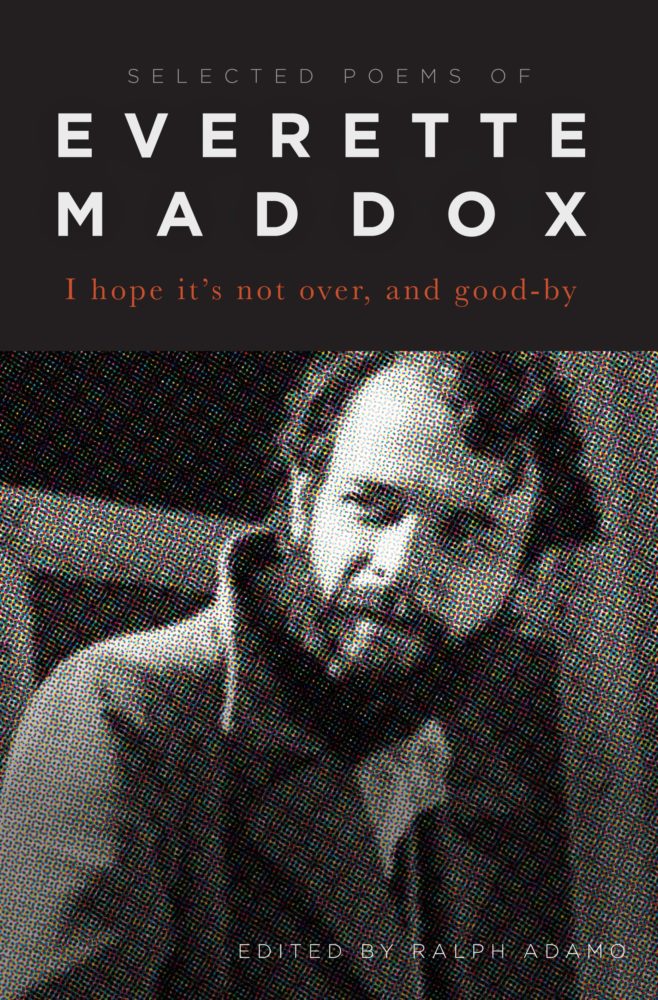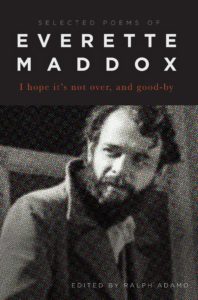Everette Maddox
Everette Maddox was a poet known for his powers of wit and observation which he used to great effect in his works.

University of New Orleans Press.
Cover of "I Hope It's Not Over And Good-by," a book of selected poetry by Everette Maddox.
Everette Hawthorne Maddox was an American poet known for his powers of wit and observation. With great dexterity, he created both tender and biting lines that simultaneously expressed a deep love of life, a disdain for the artificial, and a whimsical awareness of the ironies and inconsistencies of the human condition. Maddox spent the most productive years of his career in New Orleans, where he founded a weekly poetry reading that continues to this day.
Early Life and Career
Maddox was born in 1944 near Prattville, Alabama. Despite his parents’ middle-class backgrounds, they never managed to raise the family fortune very high and were often forced to rely on low-paying odd jobs to keep food on the table. From his mother, Maddox gained a lifelong love of literature and reading. From his father, Maddox inherited a propensity toward alcoholism and a fatalistic outlook on life. As longtime friend and New Orleans writer and radio producer Fred Kasten put it, “His immediate family—it’s not too strong a word to say they were cursed. No one lived past fifty. All died of cancer or alcoholism.”
In spite of these early struggles, Maddox enrolled at the University of Alabama, where he earned his bachelor’s degree and did postdoctoral work in literature. Already a talented writer, he published his first work in The New Yorker in 1971, no small feat for an almost-unknown poet from the Deep South. Maddox went on to publish in The Paris Review and several other journals, and before he even finished his PhD, the promising young poet and teacher was offered a position as writer in residence at Xavier University in New Orleans.
New Orleans
In 1975 Maddox and his wife, Celia, moved into a Garden District apartment at 2900 Prytania Street, the same home that F. Scott Fitzgerald lived in during his brief tenure in the Crescent City. It seemed a fitting start to a career on the rise. Maddox taught at Xavier for one year before he parted ways with the university. Some of his habits, such as wandering across campus with a glass of scotch in his hand, were frowned upon at the Catholic institution. Even so, Xavier University Press published his first collection of poetry in 1976, a chapbook entitled The 13 Original Poems. He then taught at the University of New Orleans for two years before he was cut for budgetary reasons. Finally, Maddox was hired as a teacher in the New Orleans Poetry in the Schools Program in 1980, where he made a strong impression on his young pupils. In a poem called “Even Odd,” dedicated to his students at McMain-Spectrum Junior High School, Maddox writes:
That’s your heart
doing that.
That’s your heart
laughing at the language.
The language wants
to love you: let it.
Despite his small physical stature, Maddox brought an outsized zeal for the English language that was infectious. He also appeared as something of a literary character himself, with his dapper dress suits, thick beard, and heavy southern drawl. He was as a remarkable reader and could at will recite long passages from Shakespeare, Proust, Twain, Joyce, and many others. In all, he made a larger-than-life impression on the people around him, and in New Orleans he had found the perfect home for his passions and eccentricities. The famous poet, writer, and commentator Andrei Codrescu once reminisced, “Everette Maddox made a vivid impression on me the few times I met him, because he struck me as someone who had been given the job of a sweet clown guarding a strange intersection of time and place.”
In 1982 Maddox published his next collection, the Everette Maddox Song Book, with the New Orleans Poetry Journal Press, but beneath the surface of this successful poet, the man himself was beginning to unravel.
Poet Laureate of Oak Street
Maddox is most famously associated with the Maple Leaf Bar, a drinking hole and music club in the Riverbend neighborhood of Uptown New Orleans where he spent much of his time. From his perch atop a bar stool, Maddox was often referred to as the “Poet Laureate of Oak Street,” for it was here that he would most often hold court, entertaining patrons with his wit and storytelling. He also cofounded a weekly reading series at the Maple Leaf, where he reigned as master of ceremonies for a decade—from 1979 until his untimely death in 1989. The first of its kind in New Orleans, the series hosted readings and book signings by local, regional, and national writers. The weekly readings, now titled the Everette Maddox Memorial Prose & Poetry Reading, remain a fixture of the New Orleans literary scene.
End of Days
Despite all Maddox’s talents and successes, a trio of factors was at work against him, creating an unfortunate spiral that would consume him for most of a decade. First, he lost his steady work as a teacher. Second, his marriage dissolved. Finally, his love of alcohol became a destructive addiction. As Celia later recalled, “He was resolutely on this kind of steady downward spiral when I met him, and it took me a couple years to realize that that was a conscious choice. It wasn’t just a matter of circumstance … So, with some great regret, I had to move on. This wasn’t the right life.”
Through most of the 1980s, Maddox did not write poetry at all as he went deeper into this spiral. He was divorced, mostly unemployed, and often homeless. When he wasn’t sleeping at friends’ houses or inside the Maple Leaf Bar, he spent nights in the back of a dump truck, on the stairs of a church, or on a Riverbend park bench. In one famous anecdote, Maddox was found sleeping on a bench using a newspaper for a blanket, and he, himself, was written up in the pages under which he slept.
In 1988, just months before his death, Maddox began to write again. At first the poems were inspired by his affection for a young woman who worked at Muddy Waters, a music club near the Maple Leaf. Soon the poems began to flow, uncorked after years, and he captured them on bar napkins and beer coasters, on menus, or whatever scraps of paper were at hand. He brought the crumpled works to the Maple Leaf, where they were stored behind the bar in a paper bag from a K&B drugstore. “For the archives,” Maddox would say as he deposited the works onto the bar. In addition, Pirogue Press released the 1988 collection Bar Scotch, which was culled from Maddox’s older books. It was the last work Maddox would see published before his death, just months later, on February 13, 1989, when he was admitted to Charity Hospital and succumbed to esophageal cancer. His body was cremated, and his remains were paraded through the Riverbend neighborhood in a raucous jazz funeral and second line that ended at the Maple Leaf Bar. A portion of his ashes are buried in the bar’s patio beneath a headstone that reads, “He was a mess”; the rest were scattered into the Mississippi River, which was a powerful influence on Maddox’s poetry and life.
It took several years for his friends and followers to tackle the “archives” without Maddox to guide them, but in 1993, from the lowly K&B bag stashed under the bar, they produced what is widely regarded as one of his finest collections of works, American Waste.
